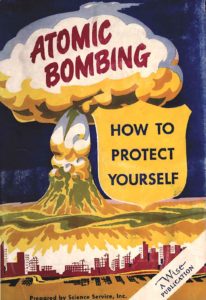 Apparently Donald Trump is making Doomsday Preppers out of those who once scoffed at the apocalypse.
Apparently Donald Trump is making Doomsday Preppers out of those who once scoffed at the apocalypse.
Wherever you fall on the political spectrum, you must admit that the election of Trump has been revelatory. Although the U.S. economy and optimism indexes are responding favorably, other industries are lagging in said optimism. One such industry still trying to gauge the real import of the new President is the publishing industry.
Literary agent Janet Reid recently addressed the question, “Do current events affect what editors buy?” The writer asked,
In your years as QOTKU [Queen Of The Known Universe], have you see the tenor of publishing change as presidential administrations change? My agent told me last month that the fiction market has been tough — and she expects it to be tougher — because a lot of the folks in New York have taken a bit of a (possibly justified) apocalyptic view of things the last two months.
Perhaps this shouldn’t come as a surprise. As I pointed out in my previous post, when comparing Democrat vs. Republican Occupations, under the category of Book Publisher, Republicans are outnumbered by Democrats 100 to 0. So the notion that “the folks in New York have taken a bit of a (possibly justified) apocalyptic view of things” since Trump’s election, is not that remarkable. Reid’s response, however, is still rather fascinating.
…we’re certainly seeing a sea-change since November. There’s no market for satire. Editors aren’t looking for much of anything that’s grim. There’s enough grim (at least to their way of thinking) on the front page of the Times.
I think we’re going to see an uptick in escapist fiction.
And I think we’re going to see a lot of Resistance Fiction, as writers begin to talk about what this new zeitgeist feels like to them.
So in the Era of Trump, satire is out, as is anything too “grim.” However, Reid predicts “an uptick in escapist fiction” and “a lot of Resistance Fiction.” While “escapist fiction” could encompass a broad swath of genres (from bodice rippers to Jack-the-Rippers), Resistance Fiction is another story. Though fiction has often been used as a tool to counter political ideas or climates, both Right and Left, Reid has a very clear Resistance in mind. The #Resist hashtag is, apparently, the one hashtag that is uniting Americans in the fight against Trump. What exactly must we #resist? Well, bigotry, racism, sexism, xenophobia, etc., etc. Which leads me to conclude that Resistance Fiction is simply fiction that addresses those subjects. However, without some fairly clear attributions to the current administration, lots of fiction can probably fall under the Resistance label. Which leaves me a bit perplexed as to what kind of fiction is anti-Trump fiction.
Others see this #NewPublishingResistance in the resurgence of dystopian fiction. According to this article, Dystopian fiction has been selling like there’s no tomorrow.
Save the light reading for later. In 2017, dystopian fiction is all the rage. Gloomy classics depicting societies gone terribly wrong have shot to the top of best-seller lists like Amazon’s in recent months, including George Orwell’s “1984” and Margaret Atwood’s “The Handmaid’s Tale,” prompting publishers to ramp up production decades after the books were first released. Others have followed close behind, such as Aldous Huxley’s “Brave New World,” Sinclair Lewis’ “It Can’t Happen Here” and Ray Bradbury’s “Fahrenheit 451.”
So why the spike in dystopian tales? You guessed it. Trump!
Much of the renewed interest has followed the November election of President Donald Trump, which publishers and scholars say is no coincidence. “Definitely the election had an effect,” said LuAnn Walther,” editorial director of the paperback division at Knopf. “There’s fear out there about what is going to happen, and I think these predictive books are helpful to people who are looking for the dangers the future might hold.”
Never has an American President caused this much panic among publishers.
Dystopian tales have been popular for quite a while now. More recently, that interest has roots in the YA phenomenon, The Hunger Games, and the spate of similar novels that followed. While most of those novels are typically aimed at expounding the evils of totalitarian governments, they are seldom directly tied to current political events. The renewed interest in dystopian fiction is different than the YA trend in that 1.) This trend is generated by disaffected adults (rather than youth) and, 2.) It involves older works, not new ones. Of course, at the top of the list is George Orwell’s 1984.
Shortly after the election, 1984 surged to the top of Amazon’s best-seller list, fueled mainly by the political Left’s co-opting of the novel as a warning against the Trump administration. Which is quite fascinating. Especially when you consider that totalitarianism — re-framing speech codes and gender definitions, defining what is “permissible” thought, controlling media outlets, suppressing contrary opinions in science, academia, and the arts, censoring speech on campuses, growing the Nanny state, etc. — is currently more likely to be espoused by liberals, not conservatives.
In his article, The True Lesson of 1984, Nathan Schlueter describes the novel as “a warning against socialism.” He concludes,
…the person reading 1984 for insight into America’s current political situation should ask a number of questions: Which political party had a leading presidential candidate proudly declare himself to be a socialist? Which party’s president consistently sought to expand the regulatory administrative state, often by lawless means? Which party dominates the institutions of higher learning, where the possibility of truth has been consistently undermined by assumptions of skepticism, scientism, and value relativism, and where utility has replaced contemplation as the end of education? Which party controls America’s public-school system, where these same ideas are consistently promoted? Which party is most closely associated with Hollywood’s celebration of sexual liberation and sentimentalism? Finally, which party has sought to elevate the state over God by coercing private individuals to violate their consciences?
So what exactly is Orwell challenging us to #resist? Sexism? Bigotry? Xenophobia? All the more fascinating is how those on the political Left are using the election of Donald Trump as a call for this Resistance, while empowering the very structures that buttress the Party.
#ResistanceFiction has a long history. And if the sentiments expressed by many in the publishing industry are indicative, we should be prepared for more stories about dysfunctional societies and those who suffer in them. But perhaps the real question is why those stories did not seem urgent under the previous administration? One could argue that, under Obama there was a massive expansion of government, increased surveillance of citizens, targeting of conservative groups, and collusion with the media. Sure, there were nutters who framed this as evidence of Armageddon. However, the paranoia has now switched sides. The fact that a #Resistance has only now arisen makes me wonder where it was and who’s leading the charge. Then again, perhaps it’s Big Brother himself.














Not exactly. Dystopia fiction has been going strong for years, even on the liberal side of the fence. The publication story of Wool by Hugh Howey is a case in point. The current presidency just gives publishers a good hook to promote the classics, and they’re milking it, as usual.